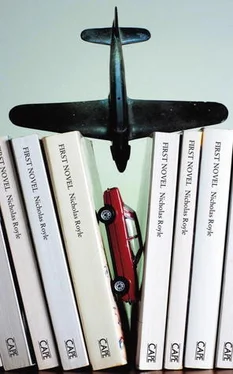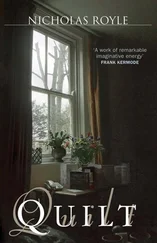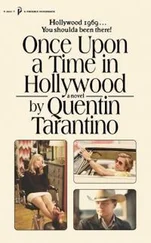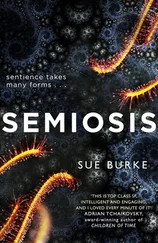I step into Lewis’ kitchen, my shoes crunching on grit. If I didn’t know this was Lewis’ kitchen I wouldn’t immediately guess it from what I see around me. The cupboards and cabinets have gone. The floor, too. I’m standing on bare cement. Everything has gone. It looks as if it has been stripped, or abandoned halfway through building. There’s a business calendar hanging on the wall, some dates ringed with red pen, scribbled notes that are impossible to read. On the floor, something catches my eye. I bend down to pick it up. A creased photograph of a woman with flaming red hair and two little blonde girls. I go to put it down somewhere, but there’s nowhere, so I drop it on the floor again and walk out of the kitchen into the hall, which looks similar. I enter the rear living room. More of the same. No furniture, no big plasma-screen TV, no Neil Roland framed picture on the wall. No carefully chosen DVD collection.
I’m about to go back into the hall to go and explore upstairs when I hear a sound coming from outside, possibly the garage. Then gritty footsteps in the kitchen. I look around for somewhere to hide. There’s nowhere. A figure appears in the doorway.
‘Grace!’ I say.
She enters the room. Her squat body seems packed with unpredictable intent. Her hair has been tied back, emphasising her square jaw.
‘What are you doing here?’ I ask.
‘I followed you,’ she says, stopping a few feet away and thrusting her hands into her jeans pockets. ‘I don’t know what to call you. Paul? Dad? Neither feels right.’
‘I keep wanting to call you Jonathan,’ I say.
‘Jonathan’s dead,’ she says.
She looks at me, as if challenging me, then lowers her head to the floor.
‘What do you want me to say?’ I ask her. ‘I don’t know what to say. Do you want me to say I’m sorry?’
‘It would be a start.’
I pause, then say, ‘I am. I’m sorry. If I don’t say it easily or often enough, it’s because it isn’t adequate. I know it isn’t adequate.’
‘Do you think,’ she asks with sudden bite, ‘that saying that makes it all right? Do you?’
‘No. Nothing will make it all right. I know that.’
Neither of us speaks for several seconds. Half a minute. I breathe out; she looks around.
‘What are you doing here anyway?’ she asks.
‘I know the guy who lives here.’
‘Doesn’t look to me like anyone lives here.’
‘I reckon he’s done a bunk.’
‘What are you talking about?’ she says, twisting her face up as she looks at me. ‘No one lives here — or has lived here for years .’
‘What do you mean?’
‘Look around you. Look at the dust. At the desolation. The abandonment. It’s, I don’t know, a refurbishment put on hold. They ran out of money. Absent owner. Whatever. But no one’s lived here for a long time.’
‘How do you explain the calendar in the kitchen, in that case?’
She rocks back on her heels. ‘What calendar?’
‘Calendar in the kitchen.’
Grace turns and walks into the hall and I follow her. She enters the kitchen and the calendar is still there hanging on a nail. As she approaches it, she brushes the photo of the redhead and two blonde girls to one side with her shoe, without noticing it. I bend down and pick it up while she’s inspecting the calendar.
‘See?’ she says.
‘What?’ I say as I fold the photograph in half and slip it in my back pocket.
‘Check the date, Daddy-o.’
She points and stands aside and I see that the calendar dates from 2006. I wonder how I had failed to notice that before. I turn and walk out of the room. In the hall I look at the pile of junk mail on the floor behind the front door. I crouch down. Pizza delivery leaflets, Indian takeaway menus, flyers for cleaning firms, drive-layers and gutter-clearers. Free newspapers, plastic bags for charity donations. A small handful of franked letters in window envelopes addressed to a variety of names, none of them Lewis’.
I stand up and turn to the door to the front room. It is as bare as the main living room at the back of the house. I step back into the hall and look at the stairs. I think about what I’m doing as I climb the stairs and I think that if there was any point at all in my checking every room downstairs, there’s surely no point in my even going upstairs. I’ve never been upstairs in Lewis’ house. How will I know whether what I see is the same as it was during the times I visited Lewis’ home or is any different? And what difference would it make? A box room at the top of the stairs is empty. The next bedroom looks larger than it is only because there’s nothing in it — no bed, no wardrobe, nothing. The main bedroom, at the front of the house, is the same. I enter it nevertheless and walk across to the window and look out at the street. I take my phone out of my pocket and find Lewis’ number. I dial it and get a message saying the number has not been recognised. I put the phone away and stare out of the window, past the scaffolding poles, at the street. I don’t know how long I’ve been standing there when I hear a light tread on the stairs and I’m aware of Grace entering the room behind me. For a while she doesn’t say anything and I continue looking out of the window.
Finally, she says, ‘Who’s your imaginary friend, then?’
‘Lewis Harris,’ I say.
‘So who is he? Or, should I say, who was he?’
‘Just a guy, a guy with an annoying laugh. A writer. He lives round here. He lives here ,’ I say, gesturing at the house itself as I turn to face her.
‘Yeah, right. Has anyone else ever met him?’
‘What are you talking about?’
‘You’re a fantasist. Always have been.’
‘Lots of people have met him. I met him at a mutual friend’s barbecue.’
‘That woman you had your affair with, she was never going to be with you. You destroyed your marriage for nothing. And the lives of your children. For nothing.’
‘I slept with her twice and then I called it off. It was a mistake, but your mother made mistakes as well.’
‘Yeah, marrying you.’
Grace is looking at me. I look at her briefly, but I can’t hold her gaze.
‘Why?’ she says, in a low voice. ‘Why did you do it?’
I look up. I can see she doesn’t mean why did I marry her mother, nor why did I sleep with Susan Ashton.
‘Do you think I haven’t asked myself that question every day?’
‘And?’
I stare at the floor.
‘Your wife leaving you,’ I say, ‘is one thing. When she says she’s going to take the children and you’ll never see them again, that’s another. Part of you dies.’
‘Don’t try to universalise it,’ she says, her voice full of scorn and venom. ‘ You did this, not some universal archetype.’
Neither of us speaks for a moment. I turn and look out of the window. A breeze stirs the fallen leaves. On the other side of the street, a man walks past. When I was young I used to look at other people and think how strange it would be to be them.
‘The part of you that died,’ she says, ‘what was that? Your conscience? Your humanity?’
I don’t respond. The scaffolding poles moan in the wind. Between us in the empty bedroom the silence spreads like water. I do have something to say, but I have never said it. I have thought it to myself, but there has never been anybody to say it to. It has never been spoken out loud. I don’t know how weak it will sound. Or how wrong.
‘It’s like it’s already happened,’ I say. ‘It’s like something inside you goes — cracks, snaps, dies, whatever — and then it’s like it’s already happened. Like you’ve already done it. There’s an inevitability about it, a feeling that you don’t have a choice. It’s going to happen, because in a way it already has. You become an instrument, nothing more.’
Читать дальше












